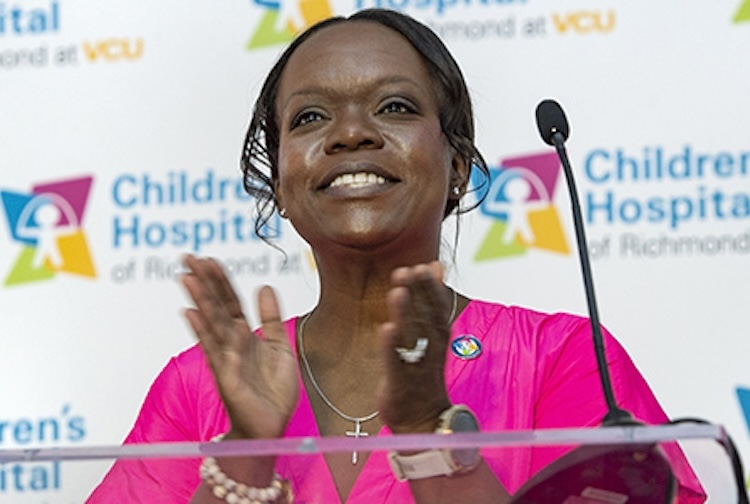
Grief? Heart disease? Fatigue? Err on the side of caution.
February 24, 2020
Suzanne Spivey is a typical, busy working mom. A 56-year-old mother of four, Spivey holds close ties to her family, has maintained a steady workout routine for most of her life, and works full time at Children’s Hospital of Richmond at VCU as a program coordinator for physical medicine and rehabilitation.
But in April 2019, Spivey was struck with the news that her older sister had unexpectedly passed away. She was in shock and grieving, and in the subsequent days, she felt a horrible, fatigued feeling throughout her body. “I was dizzy. I was short of breath,” Spivey said. “I wasn’t able to lay down because I’d have trouble breathing. I was starting to just push through the days.”
Could it be grief?
Spivey had no idea what was going on but knew it had to be more than grief. Just two weeks prior she was taking Zumba. Now she couldn’t raise her arms above her head without feeling faint. “It was just horrible how I felt,” Spivey said. “I told myself, don’t ignore this because you’re upset — it could be something else.”
In fact, what Spivey was experiencing were the symptoms of severe aortic stenosis, a potentially fatal condition in which the valve transmitting blood from the heart to the main artery of her body had narrowed, decreasing bloodflow to the rest of her body. Spivey and her family have a history of heart conditions — including a valve abnormality she had monitored since she was 18 and knew she’d have to address eventually. But as an otherwise healthy woman, she didn’t expect to get this daunting diagnosis.
By trusting her instincts and seeking help, Spivey got the care she needed
On May 2, Spivey met with VCU Health Pauley Heart Center cardiologist Phoebe Ashley, M.D., who sat with her for nearly two hours, comforting Spivey as she informed her of her full diagnosis — severe aortic stenosis due to a congenital aortic valve with two cusps instead of three, and an aortic aneurysm resulting from a weak artery wall.
Ashley prepared Spivey for what was ahead, walking her through the tests she required before open-heart surgery. Vigneshwar Kasirajan, M.D., chair of the Department of Surgery at VCU Medical Center, led the surgery. Dutifully repairing Spivey’s aorta, Kasirajan and his surgical team removed her heavily calcified aortic valve, replaced it with an artificial prosthetic valve, and took several measures to strengthen the artery.
Three days later — and only two months after her original diagnosis — Spivey went home to her family with her heart repaired.
“Her quick post-operative recovery speaks to her level of fitness heading to the operating room. Often post-operative cardiac patients spend a week or longer in recovery,” Ashley said, emphasizing how healthy living can aid in preventing, mitigating and recovery from heart diseases.
Spivey, however, also credits her instinct and the high-level, compassionate care she received at VCU Health. “Dr. Kasirajan and Dr. Ashley saved my life, and I can’t thank them enough,” Spivey said. “I had an amazing team. My doctors, the nurses, the X-ray techs, those in transportation, my cardiac rehab facilitators — everyone is just incredible here.”
How you can protect your own heart health
Throughout her ordeal, Spivey felt herself gaining strength — both mentally and physically — and growing smarter about her heart health. As we round-out this year’s American Heart Month — a time to raise awareness about the impact of heart disease — Spivey and Ashley offer these tips to protect yourself and live each day to the fullest, for many months beyond February.
- Don’t be afraid to be wrong. Spivey trusted her instinct, which ultimately brought her back to VCU Health and saved her life. She advises everyone to know their bodies and trust themselves if something feels different.
Ashley notes that heart attack symptoms include:
- Reduced exercise capacity
- Chest heaviness, pressure or tightness
- Shortness of breath
- Feeling lightheaded or dizzy
- Nausea
“If you’re slowing down a little bit or getting more tired than you typically do with your usual activities, it may not be your heart, but it warrants some investigation,” Ashley says.
- Know your family history. Family history may increase your risk for heart disease, according to the Centers for Disease Control and Prevention. “Knowing your family history is critical when we talk about things like coronary artery disease,” Ashley notes. “If you have a dad with heart disease before the age of 55, or a mom with heart disease before the age of 65, you’re at an increased risk of having coronary artery disease."
Other cardiac illnesses such as congenital issues or arrhythmias also run in families. Ashley encourages individuals who suspect they have a family history of heart disease to speak with their primary care provider and see a cardiologist for evaluation, if appropriate.
- Be proactive when it comes to eating, sleeping and physical activity. “We can keep our blood sugars, cortisol levels and adrenaline — all the things that can negatively impact the heart — down through proper diet, exercise, good sleep and stress management,” Ashley says.
When it comes to eating, Ashley recommends foods that are low in saturated fat and are less inflammatory, such as those in the Mediterranean diet, which emphasizes fruits, vegetables, whole grains, beans, nuts and healthy fats. “We have clinical research-based evidence that the Mediterranean diet is healthy from a vascular standpoint,” she says. “We also want to try to keep our weight in check, and eating a healthy diet like this can help.”
When it comes to physical activity, Ashley notes that incorporating movement into daily life is a vital part of cardiovascular health — and general health. “I like people to do things they enjoy. If you like walking, dancing, swimming or gardening — I think that's great,” Ashley says. “Simple things like parking your car at the far end of the parking lot and walking farther to get into the grocery store is beneficial.” Ashley also recommends finding a partner to join you in your activities and motivate you.
- Visit your doctor every year. Even if you aren’t currently living with a heart condition, it’s important — especially for women — to visit your doctor annually and seek cardiac care if recommended. “It's important because you can have your risk factors assessed on an annual basis,” Ashley says. “As a woman enters perimenopause and menopause, her cardiovascular risk factors can substantially change.”
Women may develop abnormally high blood pressure, gain weight and experience negative changes to their cholesterol levels as they age — all of which increase their risk factors for heart conditions. Ashley notes, “If your physician is asking the right questions, then they can tease out some symptoms that a patient may have been unintentionally ignoring or assumed were normal for getting old."
“We all make excuses for how we feel or why we are too busy or too healthy to see the doctor,” Spivey adds. “But tomorrow’s not guaranteed. Just go.”
- Don't take a moment for granted. Spivey now proudly wears a 6-inch scar on her chest. It reminds her of her resilience and increasing strength, and that life is precious. Nine months out from open-heart surgery, Spivey is taking ballet lessons for the first time in her life.
“Over the holidays when all my kids were home, we reflected on a tough 2019 and talked about what we want 2020 to look like,” Spivey said. “My youngest daughter, Tori, said, ‘Mom, you've always wanted to take ballet.’” Having always watched her children at practice but never dancing herself, Spivey signed herself up for an introductory adult class at the Richmond Ballet and has been going every Monday night for the past two months.
“At the end of the day, life is precious, so do the things you’ve always said you want to do. Just go for it. Be present. And always, love your people.”
If you feel that you may be experiencing cardiac symptoms, please visit www.vcuhealth.org/pauley for more information or to make an appointment.


.ashx)
